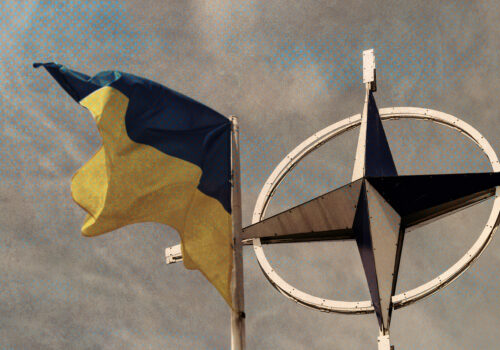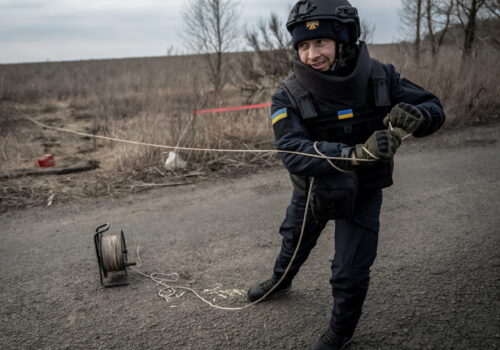What to know about the upcoming Swiss Summit on Peace in Ukraine
The upcoming Summit on Peace in Ukraine, organized by the Swiss government in coordination with the Ukrainian government, is the most ambitious convening yet for Ukraine’s ongoing effort to rally global support for its vision for a just and lasting peace in the country. The high-level gathering in Switzerland on June 15 and 16 will bring heads of state, government, and organizations together with the goal of developing a common understanding of a path toward peace in Ukraine.
Russia will not be present, and the summit at the Bürgenstock resort above Lake Lucerne is not itself a peace negotiation. Nonetheless, the gathering is important to watch for two reasons. First, Ukraine is coming to the discussions hoping to raise support for the ten-point peace plan put forward by Ukrainian President Volodymyr Zelenskyy in November 2022. Not all ten points will be on the agenda in Switzerland, but several will serve as starting points. Second, with the attendance of representatives from nearly ninety countries and organizations confirmed, the summit could be a big opportunity to showcase far-reaching support for Ukraine among non-Western countries, even if there are several notable absences, such as China.
What to expect in Switzerland
The upcoming summit in Switzerland builds on other discussions and gatherings that have been held in Copenhagen, Jeddah, Malta, and Davos. The Swiss government aims to end the summit with a final declaration—one that is, as Swiss Foreign Minister Ignazio Cassis said, “ideally” backed unanimously by the participants.
While Russia was not invited, this did not stop the Kremlin from declaring that it would not have attended if invited and insisting that the summit is pointless without a Russian presence.
Despite Russia’s dismissal, Swiss President Viola Amherd said that the summit is the “first step” toward establishing a lasting peace. As the Swiss government explained, it is hosting the summit to foster a global dialogue to improve the prospects of a future negotiated solution.
This summit will focus on three points from the Ukrainian ten-point peace plan: nuclear security, food security, and the release of prisoners of war and abducted Ukrainian children. These three points were identified as topics that can lead to positive engagement from range of countries with varying levels of support for Ukraine . The topics of nuclear security and food security also have massive global implications, and their centrality to the summit further improves the chances that countries less outspoken in their support for Ukraine will be willing to engage.
While this summit will only address these three points, Ukraine’s Foreign Minister Dmytro Kuleba assured Ukrainians that the government will not deviate from the ten points of the peace formula, noting that presenting three points now is a tactic for furthering its overall strategy and stating that “the strategic goal remains unchanged—fulfillment of all points.”
What are the benefits of holding the summit?
Ukraine’s fight against Russia is not limited to the battlefield. Diplomatic engagements, global opinion, and international attention all impact Ukraine’s ability to keep pushing back against Russian aggression. The summit offers Ukraine and its allies a chance to display solidarity from around the world and a forum to highlight the impact Russia’s war and crimes have on countries beyond Ukraine. This comes at a critical time, as war in the Middle East has dominated the headlines, Ukraine faces a dangerous situation on the battlefield, and NATO allies gear up for the upcoming Washington summit.
The narrow focus on three points from its peace plan also offers Ukraine a greater chance of engaging even countries that are closer to Russia. The chosen points offer an opportunity for countries to agree to Ukraine’s principles, even if only piecemeal at first, and begin to put in place some format where there can be an eventual agreement to end the war on terms Ukraine can agree to and see enforced.
One of the Swiss and Ukrainian aims for the summit is maximum attendance from around the world, with a focus on the Global South and others outside of Ukraine’s closest allies. As of June 10, nearly ninety countries and organizations confirmed their participation. Roughly half of the confirmations are from outside of Europe, including Chile, Thailand, and Cape Verde. However, several influential countries, including Brazil, Turkey, and South Africa, have not yet confirmed if they will attend. India said it will take part, but it is not yet clear at what level.
Especially among non-Western audiences, Kremlin propagandists regularly stir up the narrative that Ukraine and its Western supporters obstruct the possibility for peace through dialogue. This summit and Ukraine’s role in organizing it disproves that point. It also showcases Ukraine’s commitment to the principles and purposes of the United Nations (UN) charter, in stark contrast with Russia, which remains seated on the UN Security Council while violating the charter with its war of aggression and countless violations of norms and laws.

What is the downside to the summit?
Despite Ukraine’s vast efforts, including Zelenskyy’s extensive and impassioned international travel, calls, and statements encouraging attendance from all countries and organizations invited, that goal has not been fully met. China was a major focus of Ukraine’s outreach, along with other countries considered close to Russia. In a blow to Ukraine, China announced that it will not send a representative. Other notable absences from Global South countries include Saudi Arabia and Pakistan.
Ukraine has long maintained a careful relationship with China, especially in public, as it has attempted to bring China closer and chip away at the nation’s “no limits” friendship with Russia. However, despite this history, China’s actions and rhetoric around the summit, along with Beijing’s refusal to attend, may have been the final straw for Zelenskyy. At the recent Shangri-La Dialogue in Singapore, the Ukrainian president accused China of attempting to undermine the summit, saying “Russia, using Chinese influence on the region, using Chinese diplomats also, does everything to disrupt the peace summit.” He added on to the accusations, saying that Ukraine has evidence that China is assisting Moscow’s war efforts.
Beyond the Global South, other absences are notable. Despite serious Ukrainian lobbying to get him to attend, US President Joe Biden will not be at the summit. The United States will be represented by Vice President Kamala Harris and National Security Advisor Jake Sullivan. Ukrainians are right to think that there would likely be more attention on the summit if Biden were to attend, and critics and propagandists are seizing on this story to say there is a lack of US confidence in the summit. But US support for Ukraine should not be questioned over this scheduling choice. The White House put out a statement on its commitment to Ukraine and the summit, and Biden’s decision to attend a campaign fundraiser instead is, if disappointing, also understandable in an election year. Additionally, Zelenskyy is expected to attend the NATO Summit in Washington, DC, in a few weeks’ time.
What needs to happen for there to be real peace in Ukraine?
Only Ukraine can define what a just and sustainable peace looks like. Any true peace and settlement of Russia’s war will need to be based on principles Ukraine can accept and see enforced. A negotiated ceasefire or compromise that allows Russia to continue occupying Ukrainian territory and abusing Ukrainian citizens will not be acceptable to Kyiv, nor should it be considered by its supporters who understand the threat Russia poses.
To reach a sustainable peace, Ukraine needs continued support on the battlefield to defend its territory and regain the territory Russia currently occupies. There will ultimately be a time for diplomacy, but Ukraine needs to make significant progress militarily for the time to be right.
As Biden misses the summit, he could nonetheless make a major contribution by enacting further policy shifts that will empower Ukraine on the battlefield. Biden recently lifted some restrictions on Ukraine’s use of US weapons to strike military targets in Russia. This was a significant change, but there are still too many limitations on Ukraine’s ability to strike military targets in Russia with US weapons. To help Ukraine get closer to a just and sustainable peace, he should remove these limitations, which would give Ukraine a greater ability to defend itself.
Shelby Magid is the deputy director of the Atlantic Council’s Eurasia Center.
Further reading
Mon, Jun 10, 2024
Building the bridge: How to inject credibility into NATO’s promise of membership for Ukraine
New Atlanticist By Ian Brzezinski
Ukraine’s bridge to NATO membership must be built in ways that institutionalize its integration into the Alliance’s structures—starting now.
Fri, Jun 7, 2024
Reconstructing Ukraine at war: The journey to prosperity starts now
Report By John E. Herbst, Olga Khakova, Charles Lichfield
Rebuilding the Ukrainian economy after Russia's full-scale invasion will be a monumental task. Reconstruction can’t wait for peace and must be a well-coordinated, inclusive process.
Thu, May 30, 2024
Why the US is giving Ukraine the green light to attack inside Russia
Fast Thinking By
With Kharkiv under threat, will this White House reversal make a difference? Our leading Ukraine-watcher gives his assessment.
Image: Ukrainian servicemen patrol an area heavily damaged by Russian military strikes, amid Russia's attack on Ukraine, in the town of Orikhiv in Zaporizhzhia region, Ukraine May 20, 2024. REUTERS/Stringer


